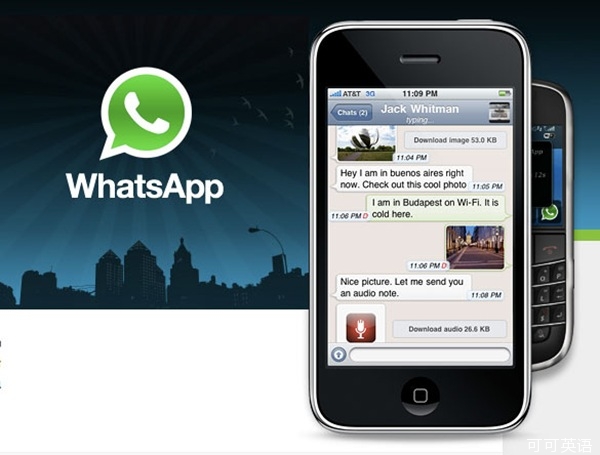(单词翻译:单击)

Why is Facebook buying WhatsApp for $19 billion? At this very moment, I am looking at a text file showing me 5,600 possible explanations. That's how many WhatsApp messages were exchanged between me and a friend in a single three-month period of 2012, when we were averaging about 60 back-and-forth messages a day.
为什么Facebook要拿出190亿美元巨资收购WhatsApp?此时此刻我正在看一个文本文档,也许它可以解释其中的原因。这是2012年区区三个月的时间里我和一位朋友之间互发的5,600条信息,平均大约60条。
It was probably a time of above-average communication -- and the messages were with a woman of above-average beauty and conversational smarts, so I had my reasons -- but it is still a useful window into how instant messaging sits right at the heart of the battle for attention that now dominates the technology industry. Skimming over those messages -- from the breezy rituals of good mornings and how are yous to hour-long heart-to-hearts -- shows how our phones are still fundamentally communicators, and how chatting, like everything else, is now facilitated by apps.
那段时间可能我挺爱聊的吧,而且我的聊天对象是一个漂亮、健谈的女士,因此我们相谈甚欢。不过,我们从中可以看出,在科技行业抢夺用户注意力的战争中,即时短讯服务俨然已经成为焦点。借助这项服务,人们可以互道早安、问好,还可以整小时整小时推心置腹地谈天。这些短讯证明,我们的手机从根本上来讲仍然是交流工具,而且五花八门的应用正让交流变得更加容易。
I was living in Dubai when those 5,600 messages were exchanged, and one of WhatsApp's most notable traits is that it seems to be significantly more popular outside the U.S. than it is within - almost all of my phone book's contacts in Europe, the Middle East or Australia are active on WhatsApp, while the ratio is much lower here in America.
我和朋友聊得火热的那段日子我正住在迪拜,而且WhatsApp最显著的一个特征就是,它似乎在美国以外的地区要更受欢迎――我电话簿里面分布在欧洲、中东和澳大利亚的联系人几乎全都爱用WhatsApp,而美国本土的比例就低得多。
At its core, WhatsApp is just a nicely-done messaging app that lets you send text, pictures and video to your friends anywhere, free. Unlike Apple's iMessage, it works on all the major mobile operating systems; unlike the text messaging services offered by mobile network operators, it doesn't charge you anything for sending the messages, and it works like modern mobile software, not the primitive SMS applications on most phones.
核心问题在于,WhatsApp仅仅是一款不错的短讯应用,你可以免费给各地的朋友发送文字、图片及视频。与苹果(Apple)的iMessage所不同的是,这款应用在所有主要移动操作系统上都可以运行;而且你发信息完全免费,不像移动网络运营商的短信服务还要收钱;再者,它是一款新型移动软件,不是多数手机上那种老旧的短信应用。
The problems WhatsApp solves could, in part, also explain why it is less of a big deal at home in the U.S. Most monthly mobile plans here include unlimited text messaging, creating an all-you-can-eat mentality around sending SMS that didn't exist overseas, where operators often charged per message. And while 310 million Americans share a single nation -- and telephone network -- in the rest of the world national boundaries between people are more likely to introduce the expensive headache of international calling and text messaging. That's another problem solved by WhatsApp.
WhatsApp的上述优点或许可以部分解释为何它在美国本土不太流行。美国多数包月移动套餐都包含了无限量短信,向用户传递出一种“随便发”的信号,而在很多国家都没有这种服务,运营商对短信按条收费。而且,虽然3.1亿美国人共享着同一个电话网络,但在世界上其他国家,打国际长途、发越洋短信可能昂贵得令人头痛,这个问题在WhatsApp那里也得到了完美解决。
But ultimately, the appeal of mobile messaging software is the same as the appeal of everything else on a mobile: it's with you all the time, it's always connected, and it has an immediacy that can't be matched. When friends are on WhatsApp, or iMessage, or BlackBerry Messenger, it's like you've opened up an endless two-way chat room.
不过,归根结底,移动短讯软件的诱惑力其实就是“移动设备”本身的吸引力:它总是伴随在你左右,它和外界的联系永远不会断,它拥有无与伦比的即时性。无论朋友们用的是WhatsApp、iMessage还是黑莓(BlackBerry)的Messenger,只要他们在线,就好像为你开启了一间畅所欲言的聊天室一样。
And once it's open, the marginal cost of sending one more message, or sharing one more picture, is so close to zero that before you know it, you've sent a few thousand of them, in a few months, to a beautiful women a couple of thousand miles away.
只要打开该应用,就可以无限量发送信息及图片、而且成本几乎为零。比如我,短短几个月的时间里就跟数千公里之外的美女朋友互发了数千条信息,当时我都没意识到发了这么多。
The centrality of instant messaging to our mobile lives can be seen in how the giants of the industry have approached it. Apple's iOS and Google's Android have both built messaging applications that erase the distinctions between SMS messages sent over the mobile network and web-based instant messages, pushing users into their own messaging platforms in the process. BlackBerry has long highlighted it's BlackBerry Messenger service -- another mobile messaging product wildly popular abroad -- as one of its trophy assets.
即时通讯之于移动生活的重要性,从科技巨头们趋之若鹜的态度就可窥知一二。苹果的iOS、谷歌(Google)的安卓(Android)操作系统都建立起了短讯应用,来消除手机短信服务和基于互联网的即时讯息之间的差异,将用户吸引到他们自己的短讯平台上来。黑莓也一直在大力宣传它的“得意之作”BlackBerry Messenger服务,这种产品在美国以外的地区也很受欢迎。
Facebook added instant messaging to its Instagram photo sharing service, tried without success to buy messaging service Snapchat, and has now spent as much money buying WhatsApp as the market value of American corporate giants like Gap, Blackstone or Harley Davidson.
Facebook也给旗下的Instagram照片分享服务添加了即时通讯功能,但收购短讯应用Snapchat的尝试未能成功。现在,该公司又豪掷亿金收购WhatsApp,其斥资之巨堪比Gap、黑石集团(Blackstone)、哈雷戴维森公司(Harley Davidson)等美国企业巨头的市值。
Is the valuation worth it? I have no idea, but I do know this: last week, after a years of constant usage and tens of thousands of messages, WhatsApp told me my free trial period was coming to an end, and I needed to cough up a dollar for another year of service. I paid it without second thought, and I'll bet a large majority of the company's 450 million active users will do the same.
这样的大手笔值得吗?我也不知道,但我清楚一件事:在我用了好几年、发送出数万条信息之后,WhatsApp上周告诉我,免费试用即将到期,我需要缴费1美元才能获得一年的服务。我毫不犹豫地支付了1美元,而且我敢打赌,WhatsApp那4.5亿名活跃用户肯定大多数都和我的想法一样。


